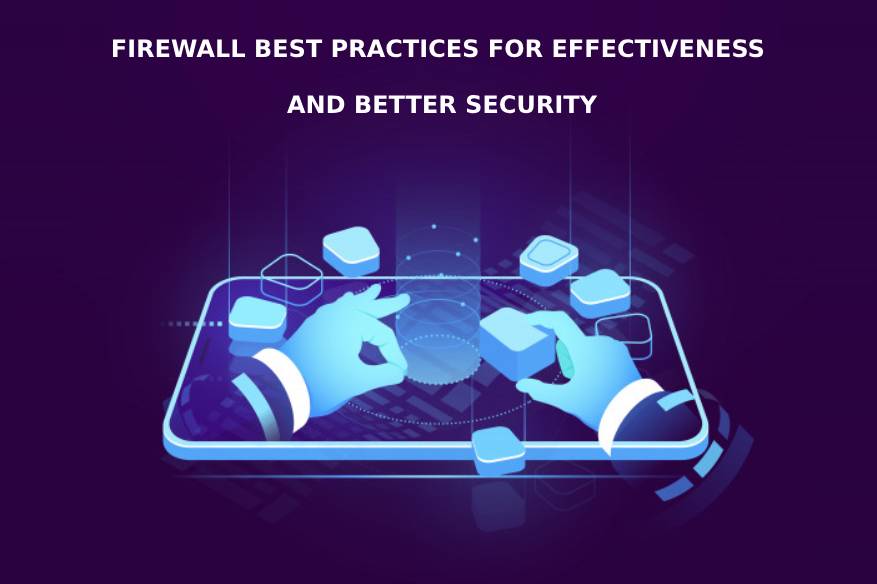Firewall Best Practices For Effectiveness And Better Security

A firewall is a must for protecting any system or network against security threats and attacks. A firewall, as we know, protects systems and networks by establishing a barrier between the trusted internal network and the untrusted external network (for example, the internet), and monitors/controls inbound and outbound network traffic based on predetermined security rules.
Anyhow, merely having the firewall software installed wouldn’t be enough. There are certain things that need to be done to ensure maximum effectiveness of the firewall software and enhanced security. Here’s a list of things, firewall best practices, that could help any IT administrator in enhancing the performance and effectiveness of the firewall software and thereby ensure better protection against threats and attacks…
Document rules and classify them for better performance
As we know, the firewall software works based on certain predetermined security rules. Hence, it’s always best to document the firewall rules so that everyone in the IT department has clarity and visibility regarding the rules. Documentation would be comprehensive if it includes details like the purpose of a rule, explanation for special rules, the services/devices affected by a rule, date of creation of the rule etc. Make it a policy to update the document as and when new rules are added. Proper classification of rules and attempts to restrict the number of over-permissive rules would be very effective.
Organize firewall rules, keeping the most used rules on top and moving the other ones to the bottom. This helps greatly in enhancing the speed and performance of the firewall software.
Make it a policy that the firewall software grants access only to those resources that are needed to perform a company’s business. This would help in reducing risks to the enterprise network and would also ensure proper utilization of the network bandwidth.
Ensure periodic reviewing/auditing of firewall rules
It’s always important that firewall rules are analyzed and reviewed on a periodic basis. When new rules go on getting added and old ones are not reviewed, there are probabilities of rules getting redundant and contradicting each other. This might even adversely affect the performance of the firewall software and impact the security of the device/network. Auditing firewall rules also helps greatly in cleaning up unused rules and thereby avoiding clogging of the firewall processor.
Ensure automation of security audits
Security audits of firewall software are very important as they help to track impacts of configuration changes and also help in ensuring maximum effectiveness. These audits are a mix of manual tasks as well as tasks that can be automated. Recording the results of the audit is also important. The best method, however, would be to use a tool that would help in automating security audits and would also record the results from the manual tasks.
Have in place an effective real-time alert management plan
Always have in place a highly effective real-time alert management plan that would monitor the firewall in real-time, trigger alarms when something goes wrong or when there is an attack and also help in setting up an alternate firewall if the existing one goes down. The alert notifications need to be set for any changes that are made, especially relating to the firewall rules.
Retain logs as per existing regulations
Make it a policy to retain firewall logs as per the regulations that exist in your country. This is needed primarily for legal purposes.
Ensure periodic security compliance checks
It’s important to check that compliance standards are strictly adhered to; this, of course, depends on the industrial sector that a company represents. Anyhow, it’s a must that periodic security compliance checks are done. It would be best if such compliance checks and audits are automated.
Do regular penetration checks, that helps to ensure the health of your software
Penetration tests, which are done by simulating cyber attacks upon any software or network, helps in spotting security vulnerabilities and thereby ensuring the health of the software as well as network security. Make it a policy to do periodic penetration tests for your firewall software as well since that would help you in ensuring the effectiveness of the firewall rules and also in assessing its performance.
Go for an effective end-to-end change monitoring system
Having an effective end-to-end change monitoring and management system is important as regards ensuring the overall performance and effectiveness of the firewall software. It would help in tracking change procedures, which comprise requests for changes in the firewall. Thus, it tracks all those change requests that are raised, approved, tested and deployed into production. It records the reasons for the changes, the timestamps, details regarding personnel included etc and everything regarding requests, from start to finish and thereby helps in managing changes in a very effective manner.
Upgrade regularly!
This is a vital part of cybersecurity. Any software, any application that you use needs to be upgraded regularly. This applies to your firewall software also. Regular upgrading helps eliminate known vulnerabilities and keeps your network safe.
Source: https://www.itweb.co.za/content/rW1xL755Edj7Rk6m
Related Resources:
What is Virtual Firewall? | How Virtual Firewall Works?
UTM – The All In One Network Firewall